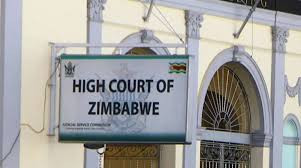
A WAR veteran pressure group has been dealt a major blow after the High Court dismissed its application seeking to stop the issuance of title deeds for land acquired by the government.
The case was heard by High Court judge Justice Samuel Deme.
The applicants — Godfrey “Zvabhendabhenda” Gurira, Joseph “Hitler” Chinyangare, Reuben Zulu, Digmore Ndiya and the War Veterans Pressure Group Trust — cited President Emmerson Mnangagwa, Lands minister Anxious Masuka and the Zimbabwe Land
Commission as respondents, respectively.
The applicants werebeing represented by Tendai Biti, while Ms Musangwa represented the respondents.
The group was seeking a constitutional declarator, arguing that the new land tenure policy announced by the President on October 8, 2024, was unconstitutional.
Businessman Kudakwashe Tagwirei is the chairperson of the land tenure implementation committee.
The war veterans sought relief that no State-held agricultural land shall be sold, alienated or privatised without an Act of Parliament as defined in section 293(3) and that the alienation or transfer of any State agricultural land cannot be done without consultation and approval of the Zimbabwe Land Commission under section 297(1)(a).
- Fresh land invasions hit Whitecliff
- Pomona cash row escalates
- Border Timbers targets European markets
- SA name strong A side for Zim tour
Keep Reading
In his ruling, Justice Deme dismissed the constitutional application with costs.
He found no merit in the application.
“Thus, it serves no purpose to declare the existing and undisputed position of the law that all old title deeds in respect of all agricultural land acquired by the government were cancelled,” the judge ruled.
The judge clarified that the State is not prevented from issuing new titles to new owners.
“However, as highlighted before, the State is not prevented from issuing new titles to new owners of agricultural land in terms of section 293(1) as read with section 292 of the Constitution,” Justice Deme said.
He agreed with the respondents’ argument that section 72(5) does not prevent the State from issuing new titles after the cancellation of old ones, adding that the State was obliged to improve the security of land tenure.
The respondents opposed the application, arguing that the applicants are wrong to assume that the Act required under section 293(3) is not in place.
They cited the Land Commission Act [Chapter 20:29] as the legislation fulfilling that constitutional requirement.
Regarding the role of the Zimbabwe Land Commission, the respondents argued that the Executive is not bound by the commission’s recommendations, citing section 297(3) of the Constitution and section 17 of the Land Commission Act.
They maintained that the new land tenure policy was not introduced in isolation.
Mnangagwa’s land tenure programme will see the issuance of title deeds in place of 99-year leases and offer letters previously issued to land owners.
He launched a US$500 per hectare levy for farmers with an offer letter, permit or lease for agricultural purposes under the land tenure system.
The money will be used to fund the US$3,5 billion compensation for white former commercial farmers whose land was seized during the land reform programme at the turn of the millennium.
In 2020, a Global Compensation Deed Agreement was signed between the government and the Commercial Farmers Union to compensate white farmers for land taken during the land reform programme.
This agreement came into force in 2025 with an initial payment of US$3 million for the first batch of 378 farms, while the remaining amount will be paid through US-dollar denominated Treasury bonds.










